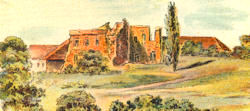German Migration to Brazil
In 1935, the "Arbeitsgemeinschaft der Deutschen aus Russland und Polen" (Working Group for Germans from Russia and Poland), working in conjunction with the German government, began to facilitate the emigration to Brazil of Germans who had been refugees from Russia. Those who met the requirements were given free transportation to Sao Paolo, were expected to work as agricultural day-laborers for one year, and were then, upon payment of an installment, assigned a permanent place to live by the Arbeitsgemeinschaft. The correspondence between the Arbeitsgemeinschaft and the applicants for emigration eventually found its way into the files of the Deutsches Ausland-Institut, and from there, by virtue of having been captured by the Allies in 1945, into the U.S. National Archives, where a small portion of it was microfilmed.
This small portion can be found on Rolls 353 and 354 of Series T-81 of the "Records of the Deutsches Ausland-Institut, Stuttgart. Part II: The General Records". It contains the correspondence of over 100 families (mostly living in Prussia) with the Arbeitsgemeinschaft, dealing with various details of the selection process, transportation, financial considerations, etc. Also included are minimal amounts of genealogical information (usually of the immediate family only). In some cases there are only one or two letters; in others, the correspondence was quite extensive. In addition, about 35 people are mentioned in letters between Arbeitsgemeinschaft officials. These names are given in the list below. Far more than these names could have been listed if the decision had not been made to microfilm only the files A through E "as a sample". And to make matters worse, the files F through Z are apparently not to be found in either the National Archives of the U.S. nor the Bundesarchiv in Koblenz, Germany. Hopefully, they have not been discarded entirely, and will be found some day. But for those few families listed here, these letters may well provide interesting information about a significant moment in their family history.
Roll 353 contains the files, A through C, while Roll 354 has the files D and E, along with the inter-office correspondence referred to above. [We are still looking for files F to Z. Note that even though most of the names in the list below begin with the letters A to E, there are still many names that begin with other letters that are mentioned in the files that contains the person whose name begins with the letters A to E] Both rolls are available at the headquarters of the Germans from Russia Historical Society in Bismarck, or may be seen at, or ordered from, the U.S. National Archives (www.nara.gov).
___________________________________________________
CONTENTS OF ROLLS 353 AND 354, SERIES T-81, OF THE RECORDS OF THE DEUTSCHES AUSLAND-INSTITUT
Film 353 contains the contents of DAI Folders 78, 79 and 80. Frame numbers extend from 5082517 to 5083907. Film 354 contains the contents of DAI Folder 81, plus other material of no relevance to Germans from Russia. Frame numbers of relevant material from 5083908 to 5084496.
Folder 78 (frames 5082517-5082734) contains mostly correspondence related to German minority affairs in Switzerland, South Africa, Southwest Africa, Spain, Yugoslavia and Czechoslovakia (S through T in German alphabetization). The time period is mostly the early to mid-1920s.
Folder 79 (frames 5082735-5083001) contains mostly correspondence from the 1920s related to German minority affairs in Hungary, Uruguay, the United States, and Venezuela (U through Z). It actually begins with a few letters concerning South Africa and Sweden, and then a file of letters relating to Germans in Nova Scotia, Canada (a few of whom were Nazi sympathizers) in the 1930s. The largest file is that of the United States, in which many letters pertain to efforts to bring German immigrants to the United States and to the Lutheran Church in the United States.
Folder 80 (frames 5083002-50839097) should be of great interest for families of Germans from Russia who emigrated during the 1930s to Brazil. This folder contains letters of these families to the Arbeitsgemeinschaft der Deutschen aus Russland und Polen (Association of Germans from Russia and Poland) in which they applied for that organization’s help in emigrating to Brazil. There was often an exchange of letters, sometimes extending over a considerable period of time, dealing with various problems involved in the application and emigration process. There was almost always a minimal amount of genealogical information given, and in many cases (marked with an asterisk*), a formal questionnaire was filled out with family information. Folder 80 contains correspondence with families whose name began with the letters A, B, and C. They are roughly in alphabetical order, but one must look through the entire list given below to be sure a name is or is not listed. The list below represents the family names in the order they appear on the microfilm. A few names recur after an interval, and these are marked with a plus sign+.
Folder 81, which was incorporated into Roll 354, covers the letters D and E, but with the addition of correspondence which mentions names beginning with letters ranging randomly from D to S. Unfortunately, the microfilming project in the 1950s filmed only these two folders “as a sample” (according to the National Archive’s “Guides to German Records Microfilmed at Alexandria, Va.”, no. 21, p. 8). The Folders which followed Folder 81 and contained files from F to Z have not been found, either in the U.S. National Archives nor in the Bundesarchiv in Koblenz, Germany.
The following is a list of surnames of families that corresponded with the Arbeitsgemeinschaft der Deutschen aus Russland und Polen in order to facilitate emigrating to Brazil in the 1930s:
Bohr, Friedrich+
Albrecht, Berthold*+
Albrecht, Daniel
Albrecht, Willi
Alexander, Waldemar
Altenburg, August
Althausen, Wilhelm*
Anuschewski, August
Ablas, Adolf
Ablas, Friedrich*
Appel, Alexander
Arndt, Adolf
Arndt, Alexander*
Arndt, August*
Arndt, Franz*
Arndt, Rudolf
Arndt, Wilhelm+
Assmann, Albert
Assmann, Emil
Bach, Kurt
Barke, Heinrich
Baldiga, Stanislaus
Balko, Elsa
Balko, Wilhelm*
Baltrusch, Karl
Bonz, Mattes
Baranowski, Andreas
Barth, Friedrich+
Bonkat, Franz*+ and Otto Helfensteller
Bonke, Adolf
Bopp, August
Borczyk, Nikita (Anani)*
Bernstein, Wolf
Botschanow, Alexander*
Brachmann, Julius*
Brandt, Robert
Breitkreuz, Adolf
Bremer, Adolf
Brennt, Eduard* (with mentions of Theodore Jahnke,Wilhelm and Friedrich Kluge, and Friedrich Herbst)
Bresilge, Gustav
Brockmann, Alfred
Brode, Hermann
Brodowski, Alexander
Bross, Eduard+
Bohr, Heinrich (Friedrich?)
Bomball, Hermann*
Bonkat, Franz
Bartkuz, Anton+
Beer, Emil*+
Befuss, Johannes
Begalke, Gustav
Begalke, Sigismund
Behm, Adolf
Behrendt, Anna*
Behrendt, Fritz*
Behring, Richart*
Belau, Natalie
Bender, Fritz
Benz, Emil
Berft, Gustav
Berft, Julius
Berg, Adolf+
Baumgart, Adolf*+
Baumgart, Erich
Bayer, Adolf
Bechnarck (Bednarck?), Julius
Bachmann, Alfred
Beck, Friedrich
Becker, Joseph
Bedunski, Josef* and Jerzy Chmielewicz
Beer, Emil
Achenbach, Ewald*
Abram, Alfred
Albrecht, Assaff
Adam, Gottlieb
Albrecht, Berthol
Bross, Eduard
Broziv (Brozic?), Karl
Bullmann, Josef
Bülow, Georg*
Bülow, Gottfried
Busch, Ferdinand
Busch, Franz
Buch, Gottlieb
Busch, Robert* and Wilhelm Lange, Hulda Lange, and Olga Lange
Berg, Adolf*
Berg, Gustav*
Besser, Eduard*
Bessert, Richard
Bethke, Ernst*
Betker, Rudolf
Birkholz, Ferdinand+
Barth, Friedrich*
Bartkus(z?), Anton
Bartnik, Hans (and wife, Sofia Jaswiakowski)
Bartsch, B.
Bartz, Ernst
Barz, Ernst
Barz, Karl* and Konstantin (Ernst?) Hannsbauer
Basler, Walter
Bauer, Christian
Baum, Maria (widow, geb. Förster)
Baumgart, Adolf
Buss, Albert
Bussler, Gottfried*
Büttner, Edmund
Büttner, Gustav
Büttner, Wendelin
Buzin, Ferdinand*
Bycka, Iwan (Johann)
Chedor, Hans
Cherkowski, Emil
Chirkowski, Julius
Chmielewicz, Jerzy (Georg)*
Christoffel, Otto
Ciesinski, Karl
Cieslak, Josef and Theodor Fediw
Conrad, A.
Cornelius, Fritz
Czarnetzki, Josef* and Josef Kudesza
Czychy, Heinrich
Czychi, Otto*
Birkholz, Ferdinand*
Birkholz, Adolf
Birkholz, Leonhard
Bloss, Erich
Blum, Eduard*
Blum, Marta
Bobetzki, Erwin
Bochert, Erich
Bodemer, Ewald
Bodemer, Olga
Boldt, Hans
Böhm, Johann
Böhmert, Gustav
Böhnke, Johann
Böning, Friedrich
Bönch, Rudolf
Bogobowitz, Paul*
Bohr, Friedrich
(THE FOLLOWING NAMES APPEAR ON ROLL 354)
Dahlke,Wilhelm
Dallmann, Friedrich
Dallmann, Wilhelm
Damin Josef* and Karl Borchert
Daust, Heinrich
Daust, Rudolf
Dedeck, Josef
Degner, Hermann
Dehlke, Bruno and Karl Wunsner
Delius, Gustav
Denkelmann, Franz
Derdau, Alexander* and Adolf Schuster
Dey, Emanuel*
Dai, Emanuel*
Dey (Dai, Dei), Wilhelm*
Dalecki, _____
Delois, Gustav
Diesterhoff, Gustav*
Dietz, Erhard
Dietz, Konrad
Dittko, Max
Doberstein, Eduard
Dobosz, Johann
Dobyko, Wladislaus
Dohmann, Johann
Dohmann, Ernst
Domke, Albert*
Domke, Asaph
Domke, Otto*
Domreis, Leonhard
Domröse, Emmy
Dotzlaw, Simon
Dotzlaw, Adolf
Eckstein, Alfred
Dowe, Franz
Drachenberg, Hermann*
Drachenberg, Karl*
Dräger, Adolf
Dräger, Gustav*
Dreibach, Samuel*
Drews (Frau Ferdinand)
Driegert, Heinrich*
Drisner, Andreas
Düschke, Julius
Dulder, August
Dunker, Johann
Dworzak, Josef
Dyck, Wilhelm*
Dzierma, Johann*+
Ebel, Julius
Eggert, Adolf*
Eggert, Wilhelm
Eich, Jakob
Eichberg, Emil
Dzierma, Johann*
(There follows a file of correspondence with an agent of the Arbeitsgemeinschaft, Käthe Baer, mostly over financial matters, in which the following people are discussed:)
Kwast, Hermann
Kissen (Kisser?), Ewald
Kisser, Franz
Kisser, Johann Friedrich
Karo, Rudolf
Karo, Robert
Honig, Rudolf
Gaelzer-Nette (?)
Dallmann, Friedrich
Riemer, Otto
Hoffmann, Rupert
Giebelhaus, Georg
Kublun, Franz
Kublun, Otto
Skorrek, Daniel
Keferstein, (Frau)
Reinholz, Wilhelmine
Müller, Karl
Diesterhoff, Gustav
Manke, Gustav
Renz, Adolf
Kurtz, Julius
Majewski, Franz
Eichblatt, Benjamin
Eichblatt, Emma
Gau, Carl
Reinholz, Wilhelmine (Wudtke)
Müller, Georg
Haeckel, H.
Geissler, D
Hanelt, Adolf
Straukat
Stempin, Joseph
Felsch, Otto
Gutt, Franz
Lemke, Juliane
Laube, Paul
Gründler, Gerhard
(Here the file reverts to the original alphabetical order)
Eidinger, H. R.
Eisen, Ernst
Engel, Albert
Engel, Hans
Englowsky, Johann
Erbert, Eduard*
Erdmann, Adolf*
Erdmann, Leonora
Esch, Wilhelm
Eschner, Ludwig


